Ten recommended open source free text annotation tools
Mar 26, 2024 pm 08:20 PMText annotation work is the work of corresponding labels or tags to specific content in the text. Its main purpose is to provide additional information to the text for deeper analysis and processing, especially in the field of artificial intelligence.

#Text annotation is crucial for supervised machine learning tasks in artificial intelligence applications. It is used to train AI models to help more accurately understand natural language text information and improve the performance of tasks such as text classification, sentiment analysis, and language translation. Through text annotation, we can teach AI models to recognize entities in text, understand context, and make accurate predictions when new similar data appears.
This article mainly recommends some better open source text annotation tools.
1.Label Studio
https://github.com/HumanSignal/label-studio
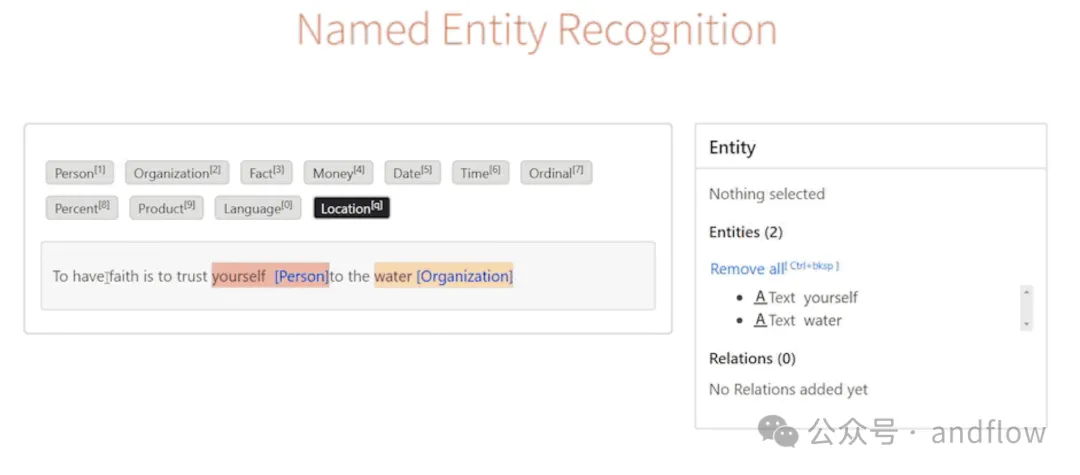
2.Doccano
https://github.com/doccano/doccano
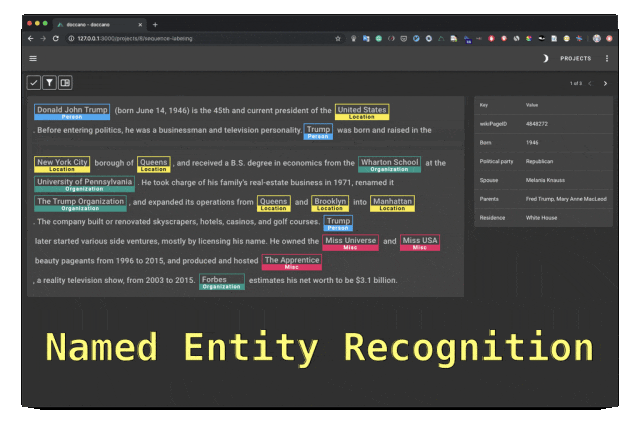
3.Universal Data Tool
https://github.com/UniversalDataTool/universal-data-tool
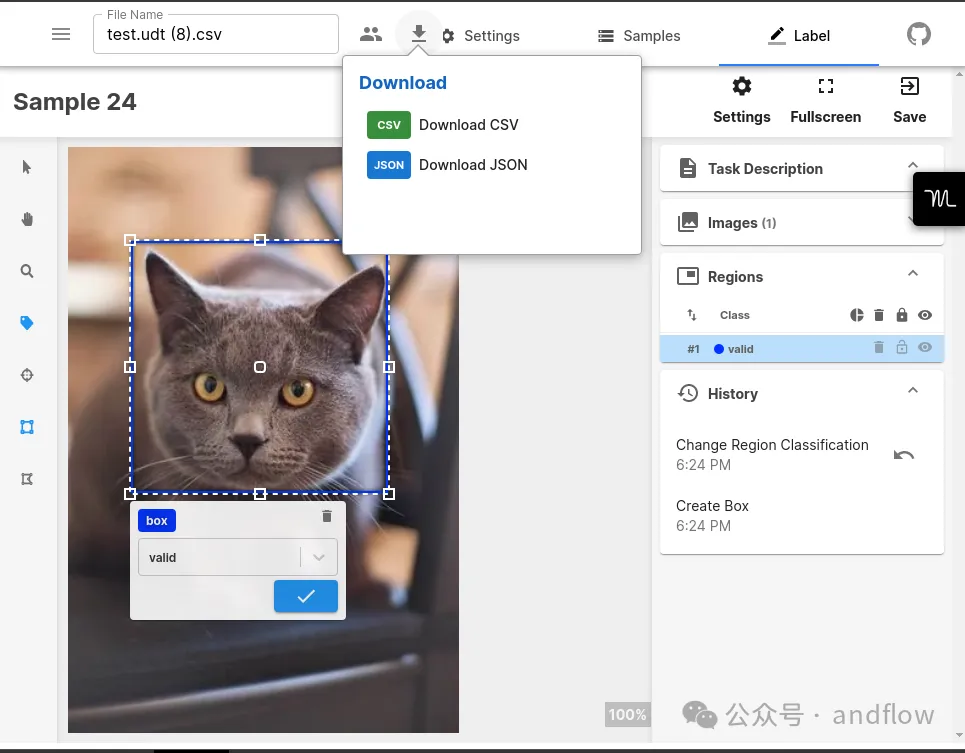
4.YEDDA
https://github.com/jiesutd/YEDDA
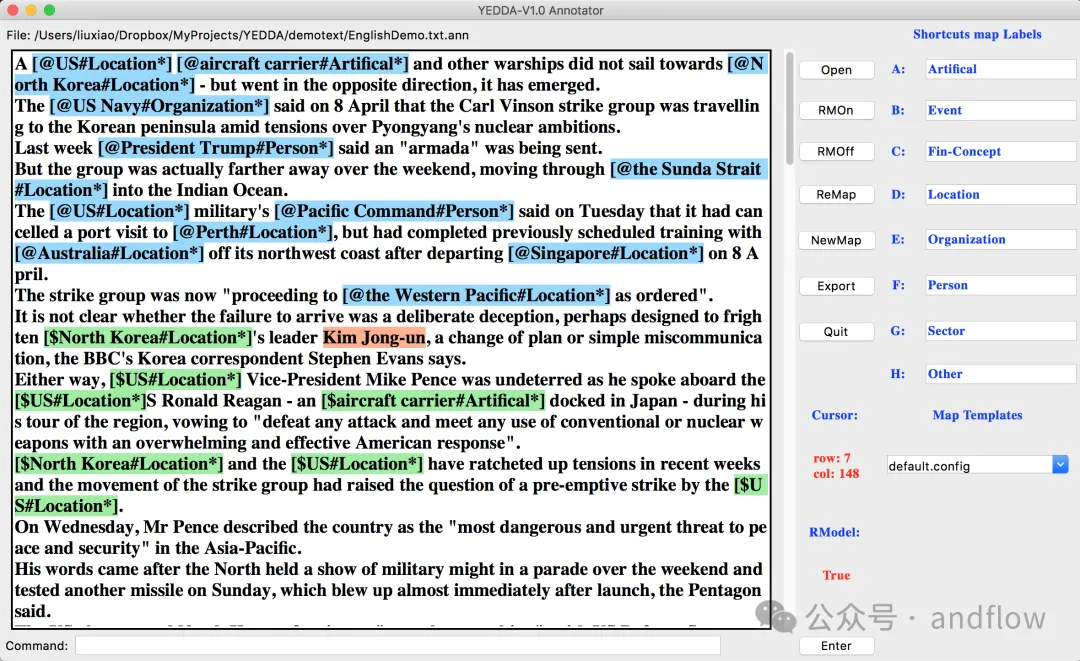
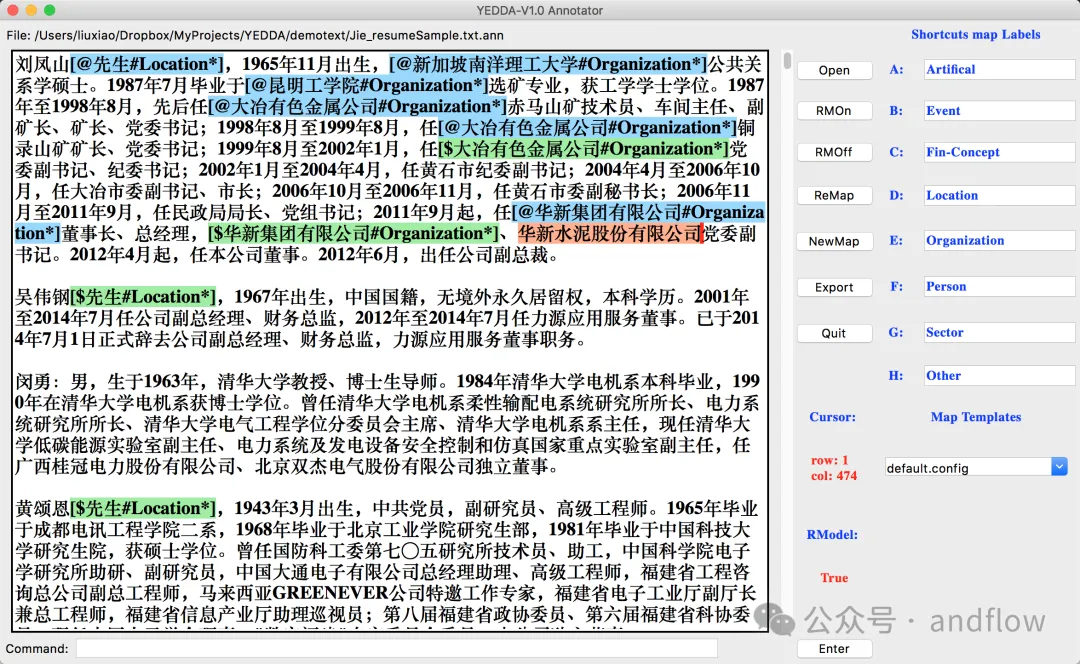
YEDDA is a text annotation tool that can be used in various languages, symbols and emoticons. It supports using shortcuts, commanding the model, and exporting annotation text as sequence text. Supports functions such as intelligent recommendations and administrator analysis.
YEDDA is compatible with all major operating systems, including Windows, Linux and MacOS.
5.Argilla
https://github.com/argilla-io/argilla
Argilla is a platform for artificial intelligence engineers An open source data collaboration platform with domain experts to provide high-quality and efficient data output.
It helps control data quality and improve AI output quality, and improves efficiency by enabling rapid iteration of data and models. Argilla also provides data management and model training tools.
6.KernAI Refinery
https://github.com/code-kern-ai/refinery
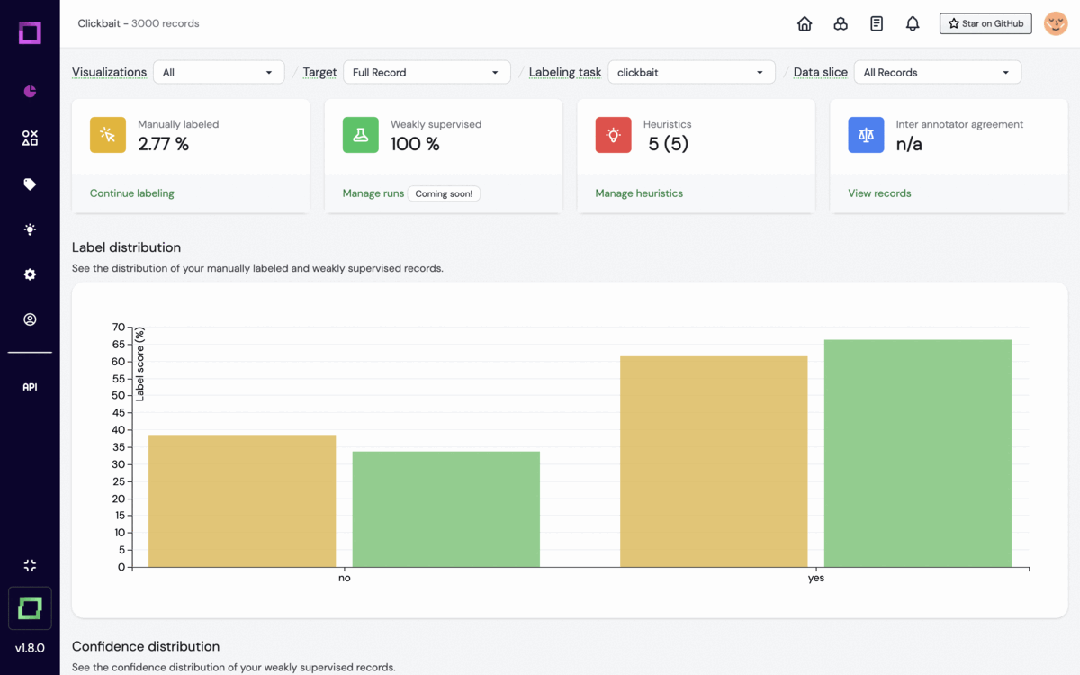
Refinery is an open source platform from KernAI designed for data scientists working with natural language data. It provides functions such as semi-automated data annotation, data subset quality assessment, and centralized data monitoring, aiming to improve manual labeling efficiency.
The tool leverages technologies such as Hugging Face and spaCy to build pre-built language models and integrates with other labeling tools for flexible data processing.
Features:
- (Semi-)automated labeling workflow for NLP tasks
- Manual and programmatic classification and span labeling
- Support with State-of-the-art library and framework integration
- Create and manage lookup tables/knowledge bases
- Neural search-based similar record and outlier retrieval
- Sliceable tag sessions
- Multiple tag tasks per project
- Rich automation library
- Extensive data management and monitoring
- Integration with Hugging Face for automated creation of embeds
- JSON-based data model for data upload/download
- Project Metrics Overview
- Access and extend data via Python SDK
- In-place attribute modification
- Team collaboration in the hosted version
- Role-based access and minimized tag view for multiple users
- Integrated group tag workflow
- Automatically Calculate agreement between annotators
7.Recogito.js
##https://github.com/recogito/recogito-js
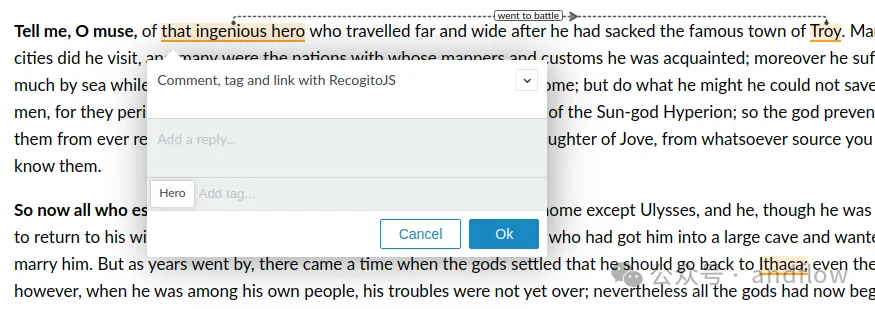
8.Label Sleuth
https://github.com/label-sleuth/label-sleuth
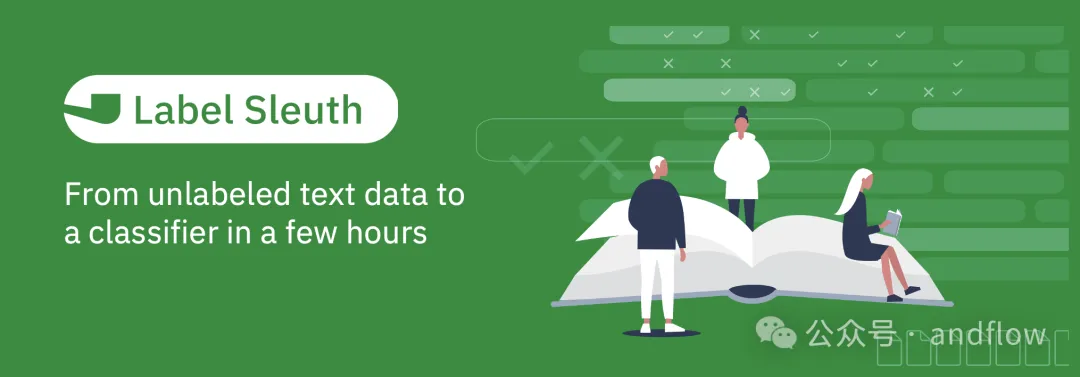
Label Sleuth is an open source, no-code system for text labeling and classification. It enables experts in fields such as doctors, lawyers, and psychologists to build custom NLP models without the cooperation of NLP experts.
Usually NLP model creation requires domain and machine learning expertise. Label Sleuth bypasses the requirement for NLP expertise with intuitive text annotation and AI model building. While users are labeling data, machine learning models are trained in the background, making predictions and suggesting what to label next.
As a no-code system, it requires no machine learning knowledge and allows rapid model development, from task definition to completed model in just a few hours.
9.Markup
https://github.com/samueldobbie/markup
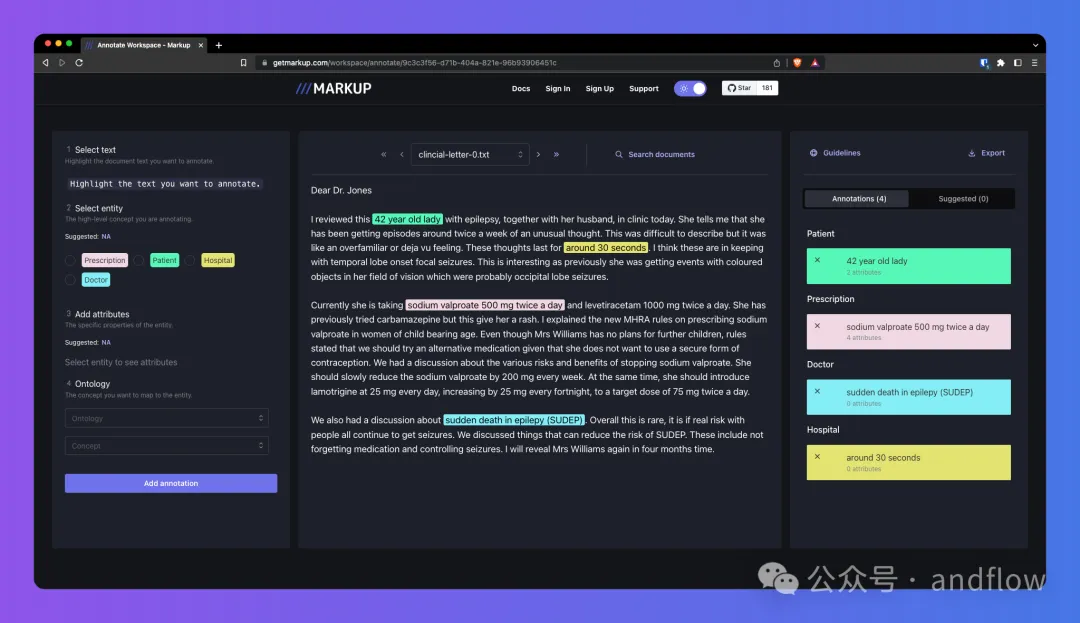
Markup is an online annotation tool that can be used to convert unstructured documents into structured formats for NLP and ML tasks, such as entity recognition. Simultaneous learning as you annotate to predict and recommend more complex annotations, and also provides integrated access to common and custom ontologies for concept mapping.
Features:
- Predictive annotation: Markup’s machine learning-driven predictive annotation function can recommend more complex annotations as you work, making the annotation process more efficient. .
- Integrated ontology access tags: Provides integrated access to a wide range of common ontologies (e.g. UMLS, SNOMED-CT, ICD-10), as well as the ability to upload custom ontologies for concept mapping.
- Predictive ontology mapping: Markup’s predictive ontology mapping feature uses machine learning to recommend appropriate mappings to standard and custom terms based on the text you are annotating.
- User-Friendly Interface: Whether you are a technical expert or a beginner, Markup's user-friendly interface makes it easy for anyone to start annotating documents with minimal setup.
10.Potato
https://github.com/davidjurgens/potato
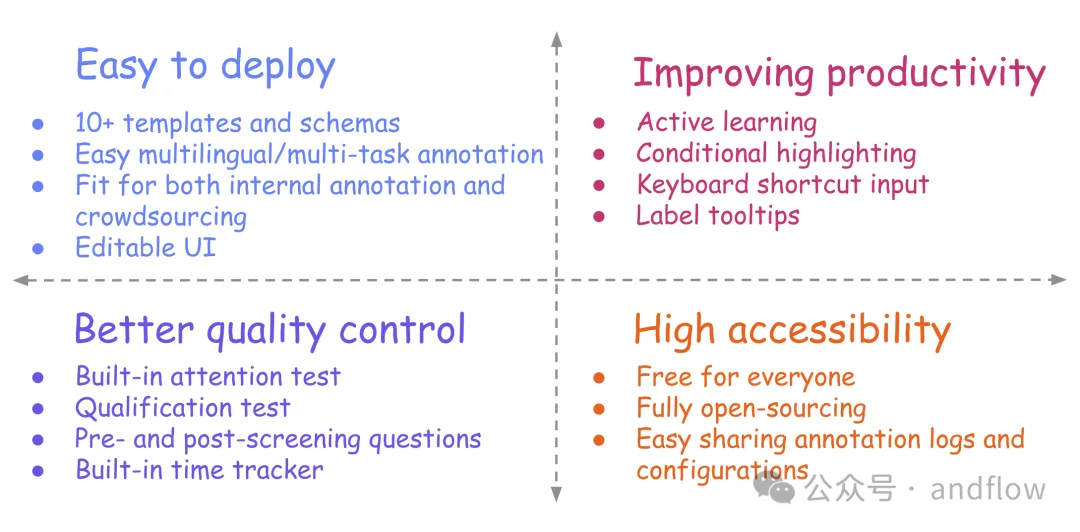
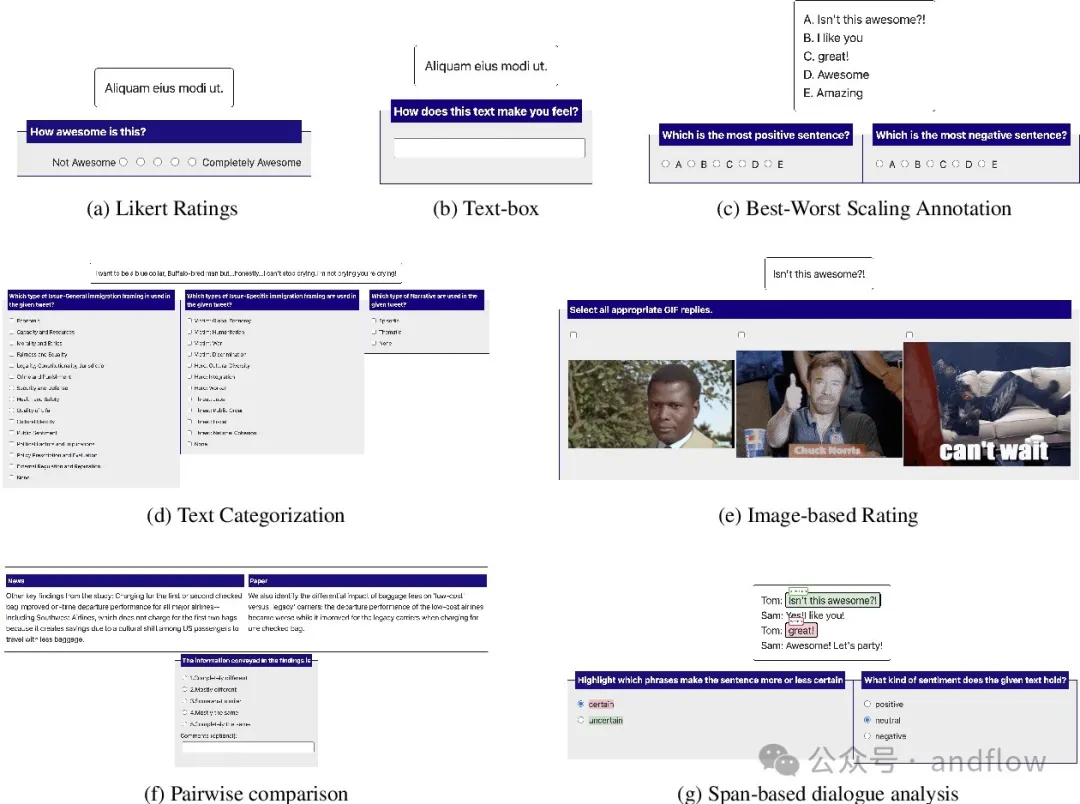
Potato is a web-based text annotation tool that supports quick setup and deployment of various text annotation tasks. Can run as a web server, driven by a single configuration file, requiring no startup coding. But Potato is easy to customize, and usually does not require additional web design to adjust the user interface for text annotators.
Key Features:
- Easy to set up and customize
- Extensive built-in schemas and templates
- Supports multiple data types
- Support multi-tasking settings
- Improve annotation efficiency with features such as keyboard shortcuts, dynamic highlighting, and label tooltips
- Get a better understanding of annotator functions, such as before and after filtering Questions
- Quality control features like attention test, qualification test and built-in time check
The above is the detailed content of Ten recommended open source free text annotation tools. For more information, please follow other related articles on the PHP Chinese website!

Hot AI Tools

Undress AI Tool
Undress images for free

Undresser.AI Undress
AI-powered app for creating realistic nude photos

AI Clothes Remover
Online AI tool for removing clothes from photos.

Clothoff.io
AI clothes remover

Video Face Swap
Swap faces in any video effortlessly with our completely free AI face swap tool!

Hot Article

Hot Tools

Notepad++7.3.1
Easy-to-use and free code editor

SublimeText3 Chinese version
Chinese version, very easy to use

Zend Studio 13.0.1
Powerful PHP integrated development environment

Dreamweaver CS6
Visual web development tools

SublimeText3 Mac version
God-level code editing software (SublimeText3)
 How to use PHP to build social sharing functions PHP sharing interface integration practice
Jul 25, 2025 pm 08:51 PM
How to use PHP to build social sharing functions PHP sharing interface integration practice
Jul 25, 2025 pm 08:51 PM
The core method of building social sharing functions in PHP is to dynamically generate sharing links that meet the requirements of each platform. 1. First get the current page or specified URL and article information; 2. Use urlencode to encode the parameters; 3. Splice and generate sharing links according to the protocols of each platform; 4. Display links on the front end for users to click and share; 5. Dynamically generate OG tags on the page to optimize sharing content display; 6. Be sure to escape user input to prevent XSS attacks. This method does not require complex authentication, has low maintenance costs, and is suitable for most content sharing needs.
 PHP calls AI intelligent voice assistant PHP voice interaction system construction
Jul 25, 2025 pm 08:45 PM
PHP calls AI intelligent voice assistant PHP voice interaction system construction
Jul 25, 2025 pm 08:45 PM
User voice input is captured and sent to the PHP backend through the MediaRecorder API of the front-end JavaScript; 2. PHP saves the audio as a temporary file and calls STTAPI (such as Google or Baidu voice recognition) to convert it into text; 3. PHP sends the text to an AI service (such as OpenAIGPT) to obtain intelligent reply; 4. PHP then calls TTSAPI (such as Baidu or Google voice synthesis) to convert the reply to a voice file; 5. PHP streams the voice file back to the front-end to play, completing interaction. The entire process is dominated by PHP to ensure seamless connection between all links.
 How to use PHP combined with AI to achieve text error correction PHP syntax detection and optimization
Jul 25, 2025 pm 08:57 PM
How to use PHP combined with AI to achieve text error correction PHP syntax detection and optimization
Jul 25, 2025 pm 08:57 PM
To realize text error correction and syntax optimization with AI, you need to follow the following steps: 1. Select a suitable AI model or API, such as Baidu, Tencent API or open source NLP library; 2. Call the API through PHP's curl or Guzzle and process the return results; 3. Display error correction information in the application and allow users to choose whether to adopt it; 4. Use php-l and PHP_CodeSniffer for syntax detection and code optimization; 5. Continuously collect feedback and update the model or rules to improve the effect. When choosing AIAPI, focus on evaluating accuracy, response speed, price and support for PHP. Code optimization should follow PSR specifications, use cache reasonably, avoid circular queries, review code regularly, and use X
 How to use PHP to combine AI to generate image. PHP automatically generates art works
Jul 25, 2025 pm 07:21 PM
How to use PHP to combine AI to generate image. PHP automatically generates art works
Jul 25, 2025 pm 07:21 PM
PHP does not directly perform AI image processing, but integrates through APIs, because it is good at web development rather than computing-intensive tasks. API integration can achieve professional division of labor, reduce costs, and improve efficiency; 2. Integrating key technologies include using Guzzle or cURL to send HTTP requests, JSON data encoding and decoding, API key security authentication, asynchronous queue processing time-consuming tasks, robust error handling and retry mechanism, image storage and display; 3. Common challenges include API cost out of control, uncontrollable generation results, poor user experience, security risks and difficult data management. The response strategies are setting user quotas and caches, providing propt guidance and multi-picture selection, asynchronous notifications and progress prompts, key environment variable storage and content audit, and cloud storage.
 PHP realizes commodity inventory management and monetization PHP inventory synchronization and alarm mechanism
Jul 25, 2025 pm 08:30 PM
PHP realizes commodity inventory management and monetization PHP inventory synchronization and alarm mechanism
Jul 25, 2025 pm 08:30 PM
PHP ensures inventory deduction atomicity through database transactions and FORUPDATE row locks to prevent high concurrent overselling; 2. Multi-platform inventory consistency depends on centralized management and event-driven synchronization, combining API/Webhook notifications and message queues to ensure reliable data transmission; 3. The alarm mechanism should set low inventory, zero/negative inventory, unsalable sales, replenishment cycles and abnormal fluctuations strategies in different scenarios, and select DingTalk, SMS or Email Responsible Persons according to the urgency, and the alarm information must be complete and clear to achieve business adaptation and rapid response.
 PHP integrated AI speech recognition and translator PHP meeting record automatic generation solution
Jul 25, 2025 pm 07:06 PM
PHP integrated AI speech recognition and translator PHP meeting record automatic generation solution
Jul 25, 2025 pm 07:06 PM
Select the appropriate AI voice recognition service and integrate PHPSDK; 2. Use PHP to call ffmpeg to convert recordings into API-required formats (such as wav); 3. Upload files to cloud storage and call API asynchronous recognition; 4. Analyze JSON results and organize text using NLP technology; 5. Generate Word or Markdown documents to complete the automation of meeting records. The entire process needs to ensure data encryption, access control and compliance to ensure privacy and security.
 How to build an online customer service robot with PHP. PHP intelligent customer service implementation technology
Jul 25, 2025 pm 06:57 PM
How to build an online customer service robot with PHP. PHP intelligent customer service implementation technology
Jul 25, 2025 pm 06:57 PM
PHP plays the role of connector and brain center in intelligent customer service, responsible for connecting front-end input, database storage and external AI services; 2. When implementing it, it is necessary to build a multi-layer architecture: the front-end receives user messages, the PHP back-end preprocesses and routes requests, first matches the local knowledge base, and misses, call external AI services such as OpenAI or Dialogflow to obtain intelligent reply; 3. Session management is written to MySQL and other databases by PHP to ensure context continuity; 4. Integrated AI services need to use Guzzle to send HTTP requests, safely store APIKeys, and do a good job of error handling and response analysis; 5. Database design must include sessions, messages, knowledge bases, and user tables, reasonably build indexes, ensure security and performance, and support robot memory
 How to use PHP to call AI writing auxiliary tools PHP improves content output efficiency
Jul 25, 2025 pm 08:18 PM
How to use PHP to call AI writing auxiliary tools PHP improves content output efficiency
Jul 25, 2025 pm 08:18 PM
When choosing an AI writing API, you need to examine stability, price, function matching and whether there is a free trial; 2. PHP uses Guzzle to send POST requests and uses json_decode to process the returned JSON data, pay attention to capturing exceptions and error codes; 3. Integrating AI content into the project requires an audit mechanism and supporting personalized customization; 4. Cache, asynchronous queue and current limiting technology can be used to optimize performance to avoid bottlenecks due to high concurrency.






